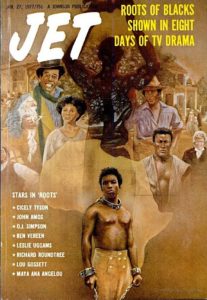A new version of Roots premieres on American television today (CORRECTION: starts tomorrow, Monday May 30. Guess I am a bit too excited!). A natural question to ask right now is, quite simply, why a remake of a classic of American television? Remakes are, after all, always tricky products of a culture that is often accused of merely recreating what has come before, and shirking the responsibility of creating something new. But it is worth thinking about 2016’s Roots as an outgrowth of the “Age of Obama,” as well as in comparison to the cultural, political, and intellectual moment of 1977.
I confess to being a bit leery when I first learned of a new version of Roots being produced. I thought about the films that have been produced in the last decade—Twelve Years a Slave, Selma, Dear White People—and television specials like The Wiz or the documentary Many Rivers to Cross—and worried that a remake of Roots risked getting lost in the shuffle. It has been an extraordinary era of African American production in  Hollywood. Consider not just the films and specials mentioned above, but other movies like The Butler, Shonda Rimes’ success on ABC, and the “Oscars So White” campaign. I hesitate to say all of this is due to the presence of Barack Obama in the White House. Nor do I want to say it is just because of the rise of the Black Lives Matters movement. However, I do think it is fair to say that the Black cultural renaissance that we are experiencing is due to these factors, among others.
Hollywood. Consider not just the films and specials mentioned above, but other movies like The Butler, Shonda Rimes’ success on ABC, and the “Oscars So White” campaign. I hesitate to say all of this is due to the presence of Barack Obama in the White House. Nor do I want to say it is just because of the rise of the Black Lives Matters movement. However, I do think it is fair to say that the Black cultural renaissance that we are experiencing is due to these factors, among others.
A new version of Roots makes sense as a symbolic end point of this exciting era of African American cultural output. That is not to say it is over. But with President Obama leaving the White House in January 2017, it remains to be seen how much longer “conversations” about the place of African Americans in the American body politic will remain popular—or at least popular enough to say front and center in American culture and politics. This also offers an interesting parallel with the release of Roots in 1977.
Consider, for a moment, the cultural and political moment in which Roots was released in 1977. Black Power’s importance was on the decline by this point.[1] Questions about the future of African American civil rights gains would come to be part of the larger  maelstrom remembered as the presidency of Jimmy Carter. The Bakke decision in 1978, followed up with worries about Ronald Reagan’s appeal to white backlash voters in 1980, gave pause to African American activists who were worried about holding on to what had been won through protest and politics in the 1960s and early 1970s.[2] In the cultural arena, shows such as Sanford and Son, Good Times, and The Jeffersons continued to go strong in the ratings. However, the Blaxploitation sub-genre of film began to die out by the latter half of the 1970s.
maelstrom remembered as the presidency of Jimmy Carter. The Bakke decision in 1978, followed up with worries about Ronald Reagan’s appeal to white backlash voters in 1980, gave pause to African American activists who were worried about holding on to what had been won through protest and politics in the 1960s and early 1970s.[2] In the cultural arena, shows such as Sanford and Son, Good Times, and The Jeffersons continued to go strong in the ratings. However, the Blaxploitation sub-genre of film began to die out by the latter half of the 1970s.
Where the 1970s ended with questions about African American cultural power as showcased at the cinema and on television, the political questions of the period seem eerily similar to an audience in 2016 America. Debates about race in the late 1970s were only part of a larger set of questions about American society, such as: what was the future of women’s rights with the debate over the ERA and reproductive rights? What of America’s economic power—was it in permanent decline? And America’s foreign policy was also guided by a sense of American decline. No doubt all these questions could all be posed today, and have in fact been a major part of the 2016 campaign.[3]
Beyond that, though, we should examine Roots in a historiographic context. Both versions of the miniseries will reflect what historians knew, and wrote, about the history of the Atlantic Slave Trade. A recent New York Times article on the new miniseries points out that the producers kept in mind recent work on the Atlantic Slave Trade. So while Roots is being remade, in many ways it appears the new miniseries will be decisively different from its predecessor. Events such as the Fort Pillow Massacre of 1864, or Kunta Kinte’s status as a member of a prosperous coastal village—as opposed to how he was portrayed in 1977—all showcase a different Roots that will further emphasize the importance of race to American history.
The History Channel has provided numerous resources for audiences to view Roots for both entertainment and educational purposes—in an era of the #FergusonSyllabus, #CharlestonSyllabus, and the #LemonadeSyllabus, this isn’t surprising at all. The intersection of historical writing from the last forty years with the more recent growth of African American voices and faces in Hollywood and elsewhere in American entertainment forms the heart of the new Roots. I have doubts that the new miniseries will generate the same national conversation as was the case in 1977, but that is due to a vastly different media landscape, along with the fact that the old conversation never ended. It merely underwent different interpretations until we reached our present moment.
But, we shall see what happens this week. Roots, one hopes, will be both entertaining and thought-provoking. And it may prove that there continues to be interest in African American history stories being told by Hollywood. After all, later this year the film The Birth of a Nation, about the Nat Turner revolt, will be released. And I am confident in saying that film will spark some discussion.
[1] Consider how books such as New Day in Babylon by William Van Deburg or Waiting ‘Til The Midnight Hour by Peniel Joseph, the two best narrative histories of Black Power, both end around 1975. This is not a coincidence, but there is more here to consider in terms of Black intellectual history and the fall of Black Power in the late 1970s.
[2] And this is not to forget the brief surge in support for the Ku Klux Klan across the country, which I wrote about here.
[3][3] Of course, there was not a Donald Trump running in 1980—although both parties did experience splits between moderate wings and their respective liberal and conservative bases of grassroots support.

0